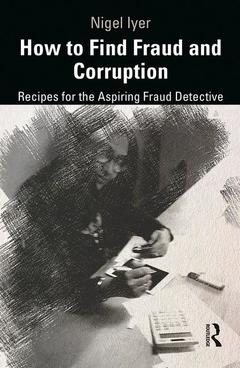How to Find Fraud and Corruption Recipes for the Aspiring Fraud Detective

In a typical working environment in which 'fraud and corruption' is as normal as a headache or as common as a cold, everyone in the organization has a role to play in finding and deterring fraudsters. Despite universal acknowledgement that these things may be illegal but still prevalent, managers still treat them as 'someone else's problem' or 'something that happens to other businesses, not ours?. This book shows, in simple terms, how everybody can become a successful fraud detective. A series of proven and easy-to-follow recipes show how to find the tell-tale signs of fraud and corruption and work with colleagues to deal with fraud smartly, keeping the organization you work for healthy and clean.
The skills taught in this book are based on over 25 years? experience of successfully finding and dealing with fraud and corruption, all around the world. How to Find Fraud and Corruption offers wayfinding techniques for identifying and recognizing common frauds such as: suppliers who charge too much; sharp business partners and consultants who are taking you for a ride; customers who take but prefer not to pay. It also shows how to spot and unravel more complex but equally serious and common frauds: hidden connections to dirty money centres (the illegitimate side of tax havens); bribes paid as a shortcut to get business; creative numbers fraud (inflation of sales figures or suppression of costs); conflicts of interest involving individuals inside or outside the business. The final chapter is a short story (based on a real case) which illustrates a fraud detective?s challenges, whether they are a reluctant whistleblower, someone who cannot turn a blind eye even if they would prefer to, or even the accused.
Accessible and practical, this book is for everyone who wants to stop fraud, including those working in accounting and finance, management, specialist functions, such as audit, compliance and security, and anyone else who aspires to be a fraud detective and stop fraud and corruption.
How to use this book,
Preface,
Acknowledgements,
Note on the text,
Part I: Fraud and corruption made simple,
1. What is a fraud detective and how can I become one? ,
2. Demystifying fraud and corruption,
3. Turning a problem into an opportunity,
Part II: Recipes for the aspiring fraud detective,
4. Three basic examples of recipes to detect red flags ,
5. Thinking like a thief: how to out-think the fraudster and predict where your organisation is being defrauded,
6. Seven classic recipes to discover fraud and corruption,
7. How to follow the money and find fraud fast
Part III: Don’t panic: there is always a way to resolve things!
8. What to do when you think you may have found fraud,
9. Resolving fraud and corruption and restoring normality with minimal panic and maximum humanity,
10. Good news for management,
The Fraud Detectives: a true case in point
References
Index
Nigel Iyer is a partner at the fraud advisory firm Hibis and has over 25 years' experience in detecting and preventing fraud. A computer scientist and a qualified chartered accountant, Nigel is also a recognised dramatist and has written a number of educational films and plays based on his experiences, many of which are used in teaching worldwide. He is the author of several books, including Fraud and Corruption: Prevention and Detection, The Tightrope and A Short Guide to Fraud Risk. Nigel lectures on fraud and corruption and is a fellow of CIMA and the University of Leicester, School of Management.
Date de parution : 11-2019
15.6x23.4 cm
Thèmes de How to Find Fraud and Corruption :
Mots-clés :
Nelson Mandela; corporate fraud; UK Home Office; auditing; Golden Tulip Hotel; bribery; Corporate Psychopaths; corporate corruption; Accounting Documentation; compliance; Build Computer Programs; accounting; Graphite Power; Dirty Money Centers; Whistleblower Policy; corruption; British Virgin Island Company; business ethics; UK Office; unethical customers; Attorney Client Privilege; fraud detection; Social Uplift Programmes; Fraud Detective; Fine Toothcomb; January 20XX; Green Brothers; Urban Rail; Senior Purchasing Manager; Constructive Mind Set; Money Flows; Fraud Risk Factor; Money Recipes; Credit Notes



